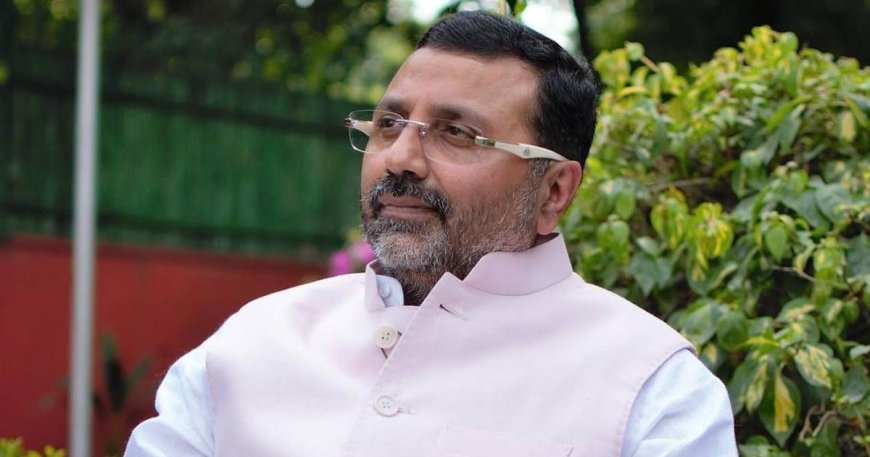BJP MP Nishikant Dubey Sparks Maharashtra Row Over Remarks on Marathi Language and Economy
BJP MP Nishikant Dubey’s remarks on Marathi language and Maharashtra’s economy spark outrage from regional parties, reigniting debates over linguistic pride and federalism.

A fresh political controversy has erupted in Maharashtra after BJP MP Nishikant Dubey made comments perceived as belittling the Marathi language and Maharashtra’s economic role in the Union. His remarks, made during a televised debate on national economic contributions by states, triggered a wave of backlash from prominent regional parties including the Shiv Sena (UBT) and the Nationalist Congress Party (Sharad Pawar faction).
What began as an economic discussion has swiftly escalated into a cultural and linguistic confrontation, with Dubey being accused of “deep insensitivity” toward Maharashtra’s identity and pride. Political observers now warn of a renewed phase of state–centre tensions, with implications for upcoming electoral alignments and federal discourse in India.
What Did Nishikant Dubey Say?
During a panel discussion on July 6, Dubey—who represents the Godda constituency in Jharkhand—allegedly remarked that “Maharashtra’s economy is overhyped” and that “Marathi isn’t a language of national relevance.” While Dubey later claimed he was misquoted, video footage circulated widely across social media platforms shows the MP criticizing “regional chauvinism” and calling for the prioritization of “nationally integrative” languages like Hindi and English.
His statement—“Marathi is only spoken in one state. It cannot hold the country back from having a unified language policy.”—was met with immediate condemnation.
Shiv Sena (UBT) and Opposition Respond
Uddhav Thackeray, leader of the Shiv Sena (UBT), called the remarks “an insult to Maharashtra’s soul” and demanded a formal apology from both Dubey and the BJP high command. In a fiery speech from Mumbai’s Shivaji Park, Thackeray said:
“Marathi is not just a language, it is an emotion, a heritage. Maharashtra’s contribution to India—economic, cultural, and patriotic—is not up for debate.”
The Maharashtra Navnirman Sena (MNS) also joined the chorus, warning of statewide protests if the remarks aren’t retracted. NCP (Sharad Pawar faction) leader Supriya Sule submitted a letter to the Lok Sabha Speaker demanding disciplinary action against Dubey for “inciting linguistic disharmony.”
Maharashtra's Economic Contribution: A Reality Check
Contrary to Dubey’s claims, Maharashtra remains India’s leading state in economic output, contributing approximately 14% to the national GDP as of FY 2024–25. Mumbai alone accounts for over 25% of India’s income tax collections and houses critical financial institutions including the Reserve Bank of India, Bombay Stock Exchange, and SEBI.
According to data from NITI Aayog and CMIE, Maharashtra leads in:
-
Industrial production
-
Service sector revenue
-
Startup capital inflows
-
Export hubs like Pune and Navi Mumbai
Economist Ajit Ranade, in a column for The Hindu BusinessLine, wrote that “criticizing Maharashtra’s economy without acknowledging its foundational role in post-liberalization growth is intellectually dishonest.”
Linguistic Sensitivities and Cultural Federalism
The debate over language is not new in India, but Dubey’s remarks reopened wounds in a state that has historically taken pride in its linguistic identity. The Samyukta Maharashtra Movement, which led to the state’s formation in 1960, was built around the protection of Marathi language and culture.
Legal experts also weighed in. Constitutional scholar Prof. Anuradha Sharma noted that Article 29 and 30 of the Indian Constitution safeguard the rights of linguistic and cultural minorities.
“Disrespecting regional languages violates both the letter and spirit of constitutional federalism,” she stated in an op-ed for The Wire.
BJP Caught in Damage Control
Though BJP has not officially commented on Dubey’s remarks, senior party figures in Maharashtra, including Devendra Fadnavis, have tried to manage the fallout. Fadnavis, in a press briefing, distanced the state unit from Dubey’s statements and affirmed that “Marathi is the pride of every Maharashtrian BJP leader.”
Nonetheless, the episode risks widening cracks between the BJP and its potential allies in Maharashtra, particularly with the Lok Sabha 2026 elections nearing.
Civil Society Reacts
Several Marathi literary bodies and cultural organizations, including the Marathi Sahitya Parishad and Pune Vidyarthi Griha, issued public statements condemning the attack on linguistic dignity.
Hashtags like #MarathiPride and #RespectMaharashtra began trending across X (formerly Twitter), Instagram, and YouTube. Civil society groups have announced a silent protest march in Pune and Nashik this weekend.
Looking Ahead
This incident may be a political flashpoint, but it also surfaces deeper questions about India’s cultural integration. How should the Union respect regional identities while pursuing national cohesion? Can political leaders afford to overlook the linguistic diversity that is central to Indian democracy?
If anything, the Nishikant Dubey controversy reinforces the importance of sensitive, inclusive political communication in an era where regional identity is tightly bound to national pride.











